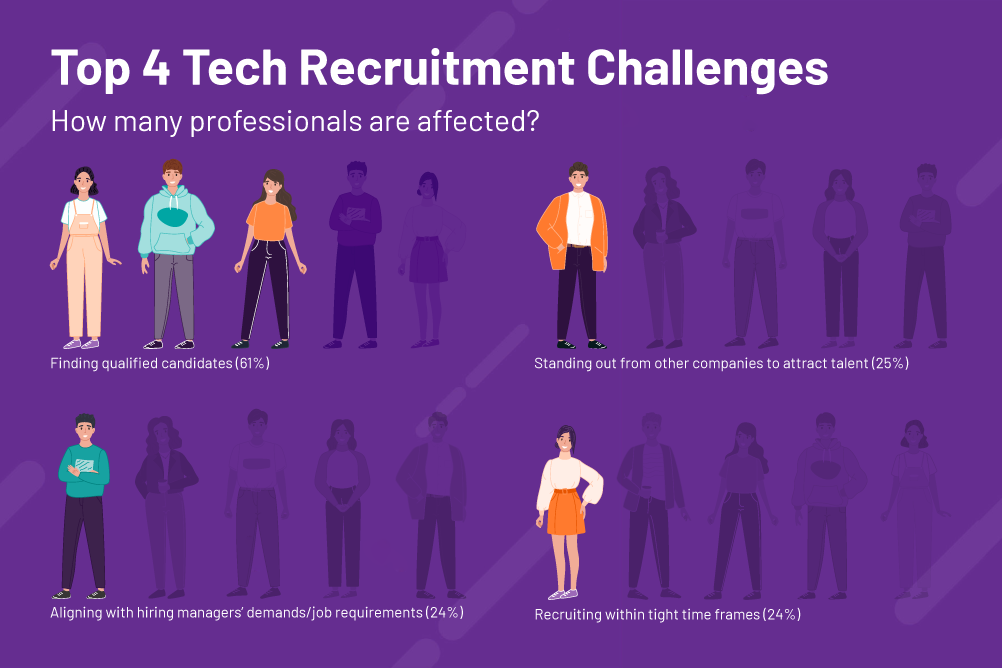Tech recruitment is about hiring tech talents performing multiple roles. But the main thing is: you must be an expert in the IT environment.
Not using appropriate methods implies some issues. The most important is not being able to assess whether a candidate is really able to join your software team.
So, being aligned to what are the technical skills and team culture are mandatory.
Tech recruitment roles and responsibilities
- Preparing the job opening. From writing and post technical job descriptions to post them on niche platforms.
- Sourcing and interviewing tech talents. Parse specialized skills and qualifications, perform pre-screening calls and interview candidates.
- Coordinating the process with digital product team leaders. This is important to forecast department goals and hiring needs.
- Keep up-to-date with new technological trends and products. Participate in tech conferences and meetups to network with IT professionals.
- Onboarding new hires and promote the company’s reputation as a great place to work.
Tech recruitment concerns
Tech recruiters’ greatest challenges and concerns vary a lot. Finding qualified candidates, recruit within tight time frames. The difference is that we are talking about one of the highly aggressive hiring markets. This hinders the speed and efficiency of the process as a whole.
Top 4 Technical Recruitment Challenges
- Finding qualified candidates (61%)
- Standing out from other companies to attract talent (25%)
- Aligning with hiring managers’ demands/job requirements (24%)
- Recruiting within tight time frames (24%)
Source: CodingGame
How is tech recruitment different from recruiting for other roles?
Hiring tech candidates for Product or Software Development Teams requires specific skills from the recruiter.
To evaluate the candidate’s qualification, you should know the basics of this environment and market. Some examples are programming languages more used, common operating systems, software proficiency, etc.
A reasonable understanding of the roles that your company is recruiting will make a difference in meeting your Software Development Team’s expectation.
| Requirement | Tech recruiter | Non-technical recruiter |
| IT Industry knowledge | High | Low/Medium |
| Have a network of technology-specific contacts | Mandatory | Not mandatory |
| Aptitude for technical profile evaluation | Very important | Medium |
Shortage of available talent: cut-throat competition for IT, engineering and product and professionals
By 2021 there will be a shortage of 1.4 million software developers and only 400,000 software developer graduates in the USA. And there’s more: it’s projected that this gap will continue to grow for at least the next ten years.
Because of it, tech recruiters must be faster to hire and make the best job offers to achieve salary expectations. Other than that, engineers should be completely integrated with the company’s team and culture. Otherwise, it’ll be impossible to avoid turnover, given that these talents receive job offers from major technology companies.
Need for advanced technical knowledge in IT, SDLC, and so on
Hiring Senior Engineers, Product Developers, and other tech talents require knowing their environment. What do they expect from an employer? Which programming languages are useful within the context of the team?
Knowing the basics in IT and SDLC (Software Development Lifecycle) will help you to:
- Better understand the needs of the team that is hiring
- Source and find qualified engineers and developers
- Talk to the candidates with ownership and self-confidence
- Attract and maintain the best tech talents to your company
Specialized Sources for talent pools (LinkedIn, GitHub, Stack Overflow, Slack, Tech Communities, etc.)
Some of the most used specialized sources for talent pools in IT are:
- Linkedin – gathers more than 4 million software engineers. Professional social media offers tools to support tech recruiters in writing job descriptions, guides to interview a software engineer, and so on.
- GitHub– used by more than 65 million people to discover, fork, and contribute to over 200 million projects. It’s a place where engineers and developers are every days.
- Stack Overflow –A public platform with more than 100 million monthly visitors. It is used by developers to find and contribute answers to technical challenges and allows recruiters to disclose job offers for specific roles.
- Other Tech Communities: Google Developer Group, Hashnode, DEV Community.
What are tech sourcers, tech recruiters, and how do they differ? Why should I specialize as one or the other?
While Sourcers attract and engage candidates, recruiters manage the relationship and the recruitment process. Essentially they work together but in different steps of the recruitment lifecycle.
Source: https://hrtalentiq.com/difference-between-recruiters-and-sourcers/
The truth of the matter is that though recruiters and sources complement each other; and in fact, are able to grow into one another’s roles, they are different disciplines.
So, if your profile is more curious and researcher, probably should choose a sourcer career. But, if your profile is more like a salesperson, a customer service rep, a psychologist, and a master negotiator so recruitment will fit better.
How do I become a tech sourcer and what will my role and responsibilities look like?
You don’t need to know how to code to be an outstanding sourcer. But to become a successful tech sourcer you need to be naturally curious about programming.
So it’s highly recommended to develop a strong understanding of the functions of programming languages and frameworks to carry a conversation with candidates. Besides that, diving into this community will be incredibly helpful to your sourcing process.
Responsibilities:
- Communicates with HR for the available positions and their requirements
- Creates job postings and sends recruitment emails
- Manages candidate interview schedule with HR
- Maintains social media and professional networks to interact with potential candidates
- Develops database for current and future hires
What does a job description for a tech recruiter look like, and how does that translate into day-to-day responsibilities?
The Technical Recruiter will identify, recruit, screen, and present good candidates for technology positions, collaborating with hiring managers to set realistic technical requirements.
Responsibilities:
- Collaborates with hiring managers to understand the needs and roles to be filled; reviews job descriptions for vacancies
- Assists with the development and revision of specifications and job descriptions for selected positions
- Identifies appropriate engineers and developers and assesses their qualifications through review of their resumes, interviews, and other forms of communications.
- Connects qualified candidates with hiring managers.
- Maintains contact with candidates to keep them apprised of the status of their applications.
Where can I learn more about tech recruiting and the key roles in software development?
Maintaining the network on the technology market and the main sourcing and recruitment strategies is mandatory to be successful in hiring seniors. Here are some good references to follow:
- Ubiminds’ Blog: a free and online blog curated for specialists to empower IT Staff Augmentation and IT careers.
- Ubiminds on YouTube: A video channel to up-to-date yourself about IT trends, programming, and recruitment.
Would you like to chat with us directly? Drop us a line.

International Marketing Leader, specialized in tech. Proud to have built marketing and business generation structures for some of the fastest-growing SaaS companies on both sides of the Atlantic (UK, DACH, Iberia, LatAm, and NorthAm). Big fan of motherhood, world music, marketing, and backpacking. A little bit nerdy too!






